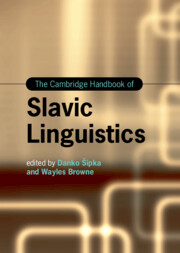Book contents
- The Cambridge Handbook of Slavic Linguistics
- Cambridge Handbooks in Language and Linguistics
- The Cambridge Handbook of Slavic Linguistics
- Copyright page
- Contents
- Figures
- Tables
- Contributors
- Introduction
- Part 1 Prosody and Phonology
- Part 2 Inflectional and Derivational Morphology
- Part 3 Syntax
- 13 Agreement
- 14 Wh-Constructions and Wh-Dependencies
- 15 Coordination and Subordination in Slavic Languages
- 16 Numerals and Quantity Expressions
- 17 Placement and Ordering of the (En)clitics
- 18 Secondary Predication
- 19 Negation and Polarity
- 20 Null Subjects
- 21 Voice
- 22 Morphosyntactic Reflexes of Information Structure
- Part 4 Lexicon
- Part 5 Sociolinguistic and Geographical Approaches
- Part 6 Experimental and Quantitative Approaches
- Name Index
- Subject Index
- References
14 - Wh-Constructions and Wh-Dependencies
from Part 3 - Syntax
Published online by Cambridge University Press: 16 May 2024
- The Cambridge Handbook of Slavic Linguistics
- Cambridge Handbooks in Language and Linguistics
- The Cambridge Handbook of Slavic Linguistics
- Copyright page
- Contents
- Figures
- Tables
- Contributors
- Introduction
- Part 1 Prosody and Phonology
- Part 2 Inflectional and Derivational Morphology
- Part 3 Syntax
- 13 Agreement
- 14 Wh-Constructions and Wh-Dependencies
- 15 Coordination and Subordination in Slavic Languages
- 16 Numerals and Quantity Expressions
- 17 Placement and Ordering of the (En)clitics
- 18 Secondary Predication
- 19 Negation and Polarity
- 20 Null Subjects
- 21 Voice
- 22 Morphosyntactic Reflexes of Information Structure
- Part 4 Lexicon
- Part 5 Sociolinguistic and Geographical Approaches
- Part 6 Experimental and Quantitative Approaches
- Name Index
- Subject Index
- References
Summary
The present chapter presents an overview of the core properties of two core types of wh-dependencies in Slavic languages: wh-questions and relative clauses. It focuses on the properties of these dependencies that Slavic languages are famous for, such as multiple wh-fronting and left branch extraction. Another property of Slavic wh-questions reviewed in this chapter is left-branch extraction and the correlation between the lack of overt articles and the availability of left-branch extraction. The second part of this chapter discusses relative clauses, including what might be dubbed non-canonical relative clauses, such as free relatives and correlatives.
- Type
- Chapter
- Information
- The Cambridge Handbook of Slavic Linguistics , pp. 282 - 303Publisher: Cambridge University PressPrint publication year: 2024

